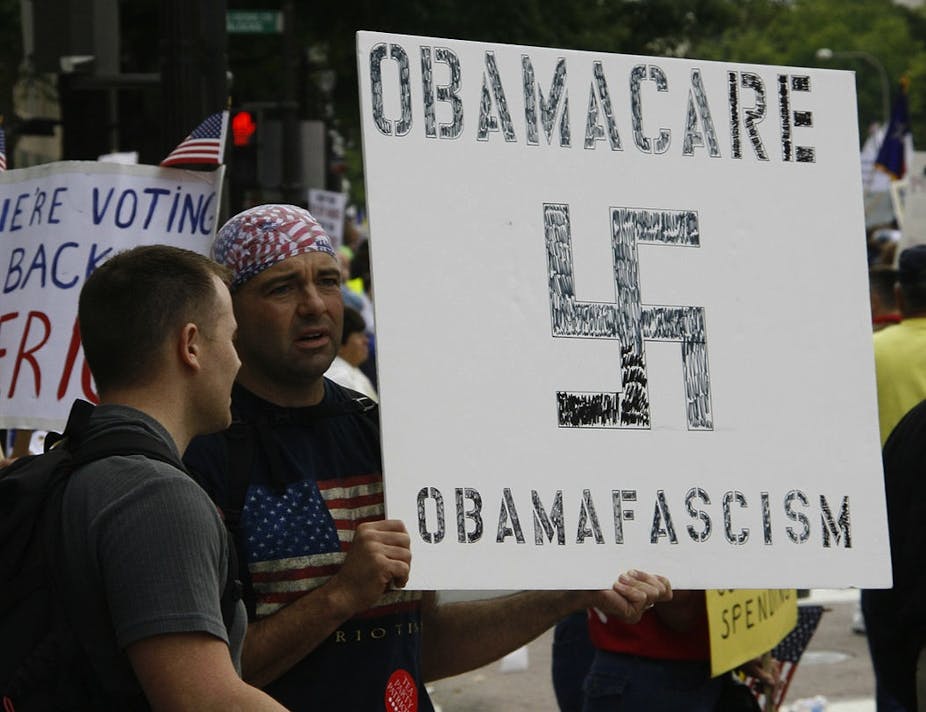The recent political standoff that shut down the US government for 16 days and came uncomfortably close to the debt ceiling extension deadline is now thankfully over — for the moment. Given the current deal only extends the debt ceiling to February 7 (and the budget to January 15), it marks the end of one round of an ongoing battle. In the words of Republican Senator Marco Rubio, “This fight is not over. It’s really only just begun.”
In many ways, the battle is for control of the Republican Party. Arguably, the reason we don’t see the same thing across the aisle is because, with Howard Dean’s appointment as the head of the Democratic National Committee (DNC) in 2005 and the ascendancy of Barack Obama — not to mention the Democratic Party’s near-total divorce from the Occupy movement — the battle for the Democratic Party has already been won.
On the other hand, the GOP’s Newt Gingrich-era coalition (symbolised by Grover Norquist’s famous mantra on “babies, guns and taxes”) has broken down, and the party now has a substantial Tea Party contingent whether it likes it or not. So the battle rages on.
The way this has played out so far is remarkable, among other things, for the fundamentally different worldviews on display of the Tea Party conservatives (and its Fox News pundits) versus Obama and the Democratic Party (and their MSNBC pundits). They exhibit basically zero common ground. Different interpretations of what should be the same reality are, of course, always a feature of partisan politics, but the divergence nowadays is extraordinarily stark. Consider, for instance, Democrats’ (and economists, and world leaders, and indeed some Republicans) frustration at having to engage with the idea that fears of not raising the debt ceiling were simply “doomsday rhetoric,” and wouldn’t really be that bad. The total breakdown in what was once a Washingtonian common sense is truly striking.
One implication is that we should probably expect things to get worse before they get better. The Democrats, Tea Party Republicans, and their respective intelligentsias will continue to interpret more or less everything (including the causes of the last crisis, the allocation of blame, and the meaning of the outcome) in totally different ways.
Another, perhaps less obvious, implication is that, while Europe’s political leadership would like to put as much distance between itself and American politics as possible at the moment, its own problems aren’t really that different.
Even as Washington’s political standoff dominated American media, for instance, French news focused on the rising electoral fortunes of the far-right Front National. The truly disturbing rise of Golden Dawn in Greece has been another recent front-page item in Europe. In Germany just last month, a new anti-Europe party with far-right leanings (the Alternative for Germany) came surprisingly close to securing parliamentary seats. In other words, the financial crisis has left extremism and anti-political alienation in its wake on both sides of the Atlantic; the Tea Party is just the American version.
So far the US political system has been able to absorb the problem by incorporating Tea Party representatives into mainstream democratic politics, which is a headache for the world, the White House, and the Republican Party, but also a way of tempering what otherwise might be a much more radical movement. The Tea Party, like all social movements, is actually many groups that have come together under one umbrella against a common set of enemies (Obama, the Democratic Party, “liberals,” the “Washington establishment,” and of course, the US government). So far its most frightening factions are more likely to be found in demonstrations than in the House of Representatives.
In this sense, the instability on display in American politics in the past few weeks (which we may well see again in early 2014) is comparable to uncertainties around the rise of far right parties, anti-political, and extremist groups in Britain, Germany, France, Italy, Finland, and elsewhere. The important difference is not some vague American “exceptionalism,” but rather a difference of democratic institutions (that is: parliamentary versus presidential, multi-party versus two party). And, of course, the international economic importance of the United States and the almighty dollar.
The central question confronting the US and its European counterparts is very much the same: whether democracy can continue to absorb the ongoing political fallout of the financial crisis. You don’t have to be much of a historian to know we’ve been here before. Hopefully we won’t lose sight of this in the scramble to tsk-tsk the failings of American politics.

